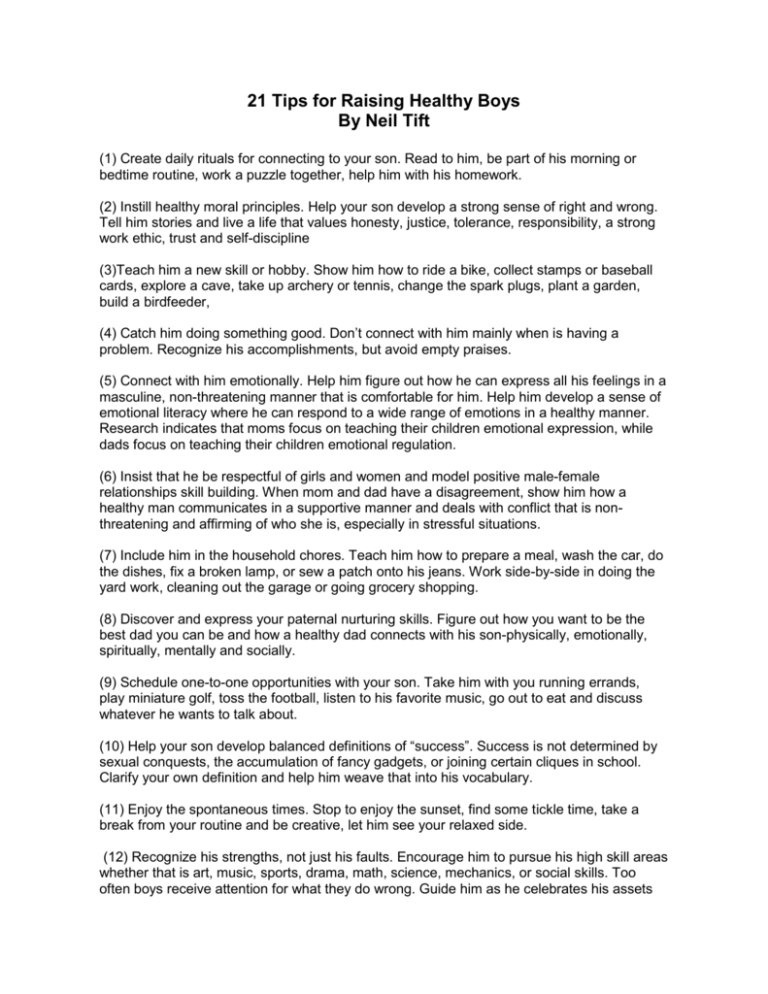
21 Tips for Raising Healthy Boys
By Neil Tift
(1) Create daily rituals for connecting to your son. Read to him, be part of his morning or
bedtime routine, work a puzzle together, help him with his homework.
(2) Instill healthy moral principles. Help your son develop a strong sense of right and wrong.
Tell him stories and live a life that values honesty, justice, tolerance, responsibility, a strong
work ethic, trust and self-discipline
(3)Teach him a new skill or hobby. Show him how to ride a bike, collect stamps or baseball
cards, explore a cave, take up archery or tennis, change the spark plugs, plant a garden,
build a birdfeeder,
(4) Catch him doing something good. Don’t connect with him mainly when is having a
problem. Recognize his accomplishments, but avoid empty praises.
(5) Connect with him emotionally. Help him figure out how he can express all his feelings in a
masculine, non-threatening manner that is comfortable for him. Help him develop a sense of
emotional literacy where he can respond to a wide range of emotions in a healthy manner.
Research indicates that moms focus on teaching their children emotional expression, while
dads focus on teaching their children emotional regulation.
(6) Insist that he be respectful of girls and women and model positive male-female
relationships skill building. When mom and dad have a disagreement, show him how a
healthy man communicates in a supportive manner and deals with conflict that is nonthreatening and affirming of who she is, especially in stressful situations.
(7) Include him in the household chores. Teach him how to prepare a meal, wash the car, do
the dishes, fix a broken lamp, or sew a patch onto his jeans. Work side-by-side in doing the
yard work, cleaning out the garage or going grocery shopping.
(8) Discover and express your paternal nurturing skills. Figure out how you want to be the
best dad you can be and how a healthy dad connects with his son-physically, emotionally,
spiritually, mentally and socially.
(9) Schedule one-to-one opportunities with your son. Take him with you running errands,
play miniature golf, toss the football, listen to his favorite music, go out to eat and discuss
whatever he wants to talk about.
(10) Help your son develop balanced definitions of “success”. Success is not determined by
sexual conquests, the accumulation of fancy gadgets, or joining certain cliques in school.
Clarify your own definition and help him weave that into his vocabulary.
(11) Enjoy the spontaneous times. Stop to enjoy the sunset, find some tickle time, take a
break from your routine and be creative, let him see your relaxed side.
(12) Recognize his strengths, not just his faults. Encourage him to pursue his high skill areas
whether that is art, music, sports, drama, math, science, mechanics, or social skills. Too
often boys receive attention for what they do wrong. Guide him as he celebrates his assets
and expands his opportunities to express them, but always help him when he is struggling
with his deficits.
(13) Celebrate family traditions and cultural events. Teach him to be proud of his roots, his
legacy, encourage his role in passing on your family heritage. Create new traditions that
reflect both sides of his extended family.
(14) Participate in parent-child programs. Consider attending Early Childhood Family
Education (ECFE), sign up for the Cub or Boy Scouts, join the YMCA, join or start a dads’
club at his school or your church.
(15) Talk openly with your son about what responsible masculine behavior looks like. Help
him explore media messages about what it means to be a man, a son, a husband, a father, a
warrior, a citizen, a brother, an American. Help him to create his own ideas of how he wants
to grow up to be a good man like his dad. Fathers instill self-regulating behaviors in their
sons. When we are engaging in competitive play with our son (rough-housing, tickling,
wrestling, shooting hoops, tossing the football) and then direct him to shift his focus to a noncompetitive activity when we are finished playing, we help him to learn that he is in control of
his emotions, that his hormones don’t control him. This teaches him to be a responsible
respectful and safe young man.
(16) Encourage him to give something back, to make the world a better place. Volunteer
together at a shelter, become a Big Brother or join a local effort to clean up the environment.
(17) Teach him when it’s appropriate to be competitive and when it’s better to be
cooperative. Football games, NASCAR and chess tournaments are times to enjoy winning.
Arguing with his little sister is a time to try to move beyond the traditional win-lose approach
and seek a win-win opportunity.
(18) Shape his spiritual or religious development. Recognize his need for understanding that
there is something greater than what we can see and feel. Teach him the power of prayer,
devotion, reflection. Help him connect this spiritual sense to the rest of his development,
whether that be his code of ethics, his sense of awe, his academic achievement or his
definition of success.
(19) Build healthy decision-making skills in your son. Promote and model respectful attitudes
and behavior. Many males growing up get into trouble when they feel disrespected and don’t
have the capacity to resolve conflicts in non-violent ways.
(20) Encourage him to select healthy friends and to avoid unhealthy friends that may lead
him in the wrong direction. Help him to recognize that who he decides to hang with as he
grows up will clearly influence how and where he spends his free time, his taste in
entertainment, his school activities and may shape his entire future.
(21) Teach him about healthy sexual development. Model healthy sexual expressions. Allow
him to ask you any questions he has about sex, relationships, sexual orientation, dating,
family planning and related topics.
Be there, be there, be there for your son.












